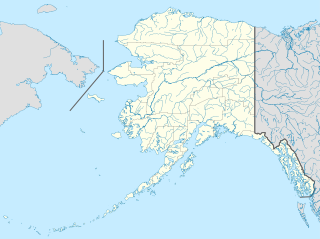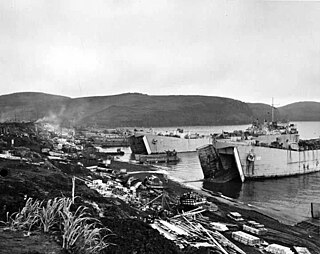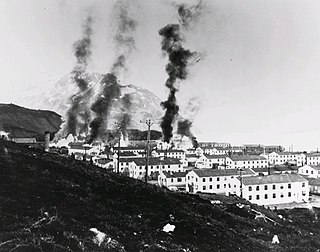
Eugene Luther Gore Vidal, better known as Gore Vidal, was an American writer and public intellectual known for his epigrammatic wit, erudition, and patrician manner. Vidal was bisexual, and in his novels and essays interrogated the social and cultural sexual norms he perceived as driving American life. Beyond literature, Vidal was heavily involved in politics. He twice sought office—unsuccessfully—as a Democratic Party candidate, first in 1960 to the United States House of Representatives, and later in 1982 to the U.S. Senate.

Unalaska is the chief center of population in the Aleutian Islands. The city is in the Aleutians West Census Area, a regional component of the Unorganized Borough in the U.S. state of Alaska. Unalaska is located on Unalaska Island and neighboring Amaknak Island in the Aleutian Islands off mainland Alaska. The population was 4,376 at the 2010 census, which is 79% of the entire Aleutians West Census Area. Unalaska is the second largest city in the Unorganized Borough, behind Bethel.

Attu is an island in the Near Islands. It is the westernmost point of the U.S. state of Alaska. The island became uninhabited in 2010, making it the largest uninhabited island in the United States.

The City and the Pillar is the third published novel by American writer Gore Vidal, written in 1946 and published on January 10, 1948. The story is about a young man who is coming of age and discovers his own homosexuality.

USS Admirable (AM-136) was the lead ship of her class of minesweeper built for the United States Navy during World War II. In commission from 1943 to 1945, she was transferred to the Soviet Navy in 1945 and served as T-331 until stricken in 1958.

The Aleutian Islands campaign was a military campaign conducted by the United States and Japan in the Aleutian Islands, part of the Territory of Alaska, in the American Theater and the Pacific Theater of World War II starting on June 3, 1942. In the only two invasions of the United States during the war, a small Japanese force occupied the islands of Attu and Kiska, where the remoteness of the islands and the challenges of weather and terrain delayed a larger American-Canadian force sent to eject them for nearly a year. The islands' strategic value was their ability to control Pacific transportation routes and so US General Billy Mitchell stated to the U.S. Congress in 1935, "I believe that in the future, whoever holds Alaska will hold the world. I think it is the most important strategic place in the world."
In meteorology, a williwaw is a sudden blast of wind descending from a mountainous coast to the sea. The word is of unknown origin, but was earliest used by British seamen in the 19th century. The usage appears for winds found in the Strait of Magellan, the Aleutian Islands and the coastal fjords of the Alaskan Panhandle, where the terms outflow wind and squamish wind are also used for the same phenomenon. On Greenland the word piteraq is used.

Akatsuki was the twenty-first Fubuki-class destroyer, or the lead ship of the Akatsuki class, built for the Imperial Japanese Navy in the inter-war period. When introduced into service, these ships were the most powerful destroyers in the world. They remained formidable weapons systems well into the Pacific War.

Ilak Island is a small island in the eastern Delarof Islands, Aleutian Islands of Alaska.

The Golden Age, a historical novel published in 2000 by Gore Vidal, is the seventh and final novel in his Narratives of Empire series.

Operation Cottage was a tactical maneuver which completed the Aleutian Islands campaign. On August 15, 1943, Allied military forces landed on Kiska Island, which had been occupied by Japanese forces since June 1942.

The Battle of Dutch Harbor took place on June 3–4, 1942, when the Imperial Japanese Navy launched two aircraft carrier raids on the Dutch Harbor Naval Operating Base and U.S. Army Fort Mears at Dutch Harbor on Amaknak Island, during the Aleutian Islands Campaign of World War II. The bombing marked the first aerial attack by an enemy on the continental United States, and was the second time in history that the continental U.S. was bombed by someone working for a foreign power, the first being the accidental bombing of Naco, Arizona in 1929.

The Battle of Attu, which took place on 11–30 May 1943, was a battle fought between forces of the United States, aided by Canadian reconnaissance and fighter-bomber support, and Japan on Attu Island off the coast of the Territory of Alaska as part of the Aleutian Islands Campaign during the American Theater and the Pacific Theater. In contrast with the tropical climate in the Pacific, Attu is the only land battle in which Japanese and American forces fought in snowy conditions.

The Japanese occupation of Kiska took place between 6 June 1942 and 28 July 1943 during the Aleutian Islands Campaign of the American Theater and the Pacific Theater of World War II. The Japanese occupied Kiska and nearby Attu Island in order to protect the northern flank of the Japanese Empire. Along with the Attu landing the next day, it was the first time that the continental United States was occupied by a foreign power since the War of 1812, and was one of the two invasions of the United States during World War II.

The 206th Field Artillery Regiment is a United States artillery regiment, currently represented in the Arkansas Army National Guard by the 1st Battalion, 206th Field Artillery, Headquartered at Russellville, Arkansas. The 1–206th FA is an element of the 39th Infantry Brigade Combat Team.

The Aleutian Islands, also called the Aleut Islands or Aleutic Islands and known before 1867 as the Catherine Archipelago, are a chain of 14 large volcanic islands and 55 smaller islands. Most of the Aleutian Islands belong to the U.S. state of Alaska, but some belong to the Russian federal subject of Kamchatka Krai. They form part of the Aleutian Arc in the Northern Pacific Ocean, occupying an area of 6,821 sq mi (17,666 km2) and extending about 1,200 mi (1,900 km) westward from the Alaska Peninsula toward the Kamchatka Peninsula in Russia, and act as a border between the Bering Sea to the north and the Pacific Ocean to the south. Crossing longitude 180°, at which point east and west longitude end, the archipelago contains both the westernmost part of the United States by longitude and the easternmost by longitude. The westernmost U.S. island in real terms, however, is Attu Island, west of which runs the International Date Line. While nearly all the archipelago is part of Alaska and is usually considered as being in the "Alaskan Bush", at the extreme western end, the small, geologically related Commander Islands belong to Russia.

The history of the Arkansas National Guard and World War II begins with the reorganization following World War I. The State first reorganized a provision unit, the 5th Arkansas, in order to provide a force to deal with domestic situations. As the Defense Department slowly implemented the massive changes and expansions outlined National Defense Act of 1916, the Arkansas National Guard was allowed to reorganize its war time units, including the 153rd Infantry Regiment, the 141st Machine Gun Battalion, and the 142nd Field Artillery. The Guard acquired its first permanent facilities and additional training during its annual encampments. During World War II, the entire Arkansas National Guard was activated and units saw duty in the Pacific and European theaters of conflict.
Private Snafu in The Aleutians—Isles of Enchantment is a short cartoon in the Private Snafu series, directed by Chuck Jones. Warner Bros. produced this film for the United States armed forces and issued it to service branches in February 1945, to inform personnel posted in the Aleutian Islands of what was then the Alaska Territory.

The Landing at Amchitka was the amphibious landing operation and occupation of Amchitka island by American forces during the Aleutian Islands Campaign.

















